UPSC Daily Current Affairs- 15th March 2024 | Current Affairs & Hindu Analysis: Daily, Weekly & Monthly PDF Download
GS-I
Gulbadan Begum
Subject: History
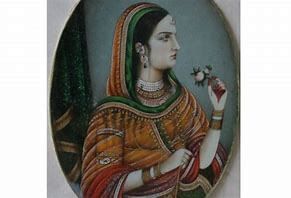
Why in News?
Historian Ruby Lal has written a book on Gulbadan Begum titled ‘Vagabond Princess: The Great Adventures of Gulbadan’.
Background:
- She is one of the most prominent women of Mughal era.
About Gulbadan Begum:
- Gulbadan Begum (1523 – 1603) was a Mughal princess and the daughter of Emperor Babur, the founder of the Mughal Empire.
- She is best known as the author of Humayun-Nama, the account of the life of her half-brother, Emperor Humayun, which she wrote on the request of her nephew, Emperor Akbar.
- Akbar asked his aunt to write the book as she had known and interacted with three Mughal emperors. Her book is not political unlike the other accounts of the time. It provides details of everyday life in the royal palace and is also an account of the empire as it was taking shape.
- Gulbadan wrote in simple Persian, without the erudite language used by better-known writers. Her father Babur had written Babur-nama in the same style.
- Gulbadan is the first and only woman historian of the Mughal era.
- Gulbadan Begum is mentioned throughout the Akbarnama of Abu’l Fazl.
Source: The Hindu
GS-II
Contract Labour (Regulation and Abolition) Act, 1970
Subject: Polity

Why in news?
The recent observation by the Supreme Court highlighted that workers engaged in perennial or permanent work should not be classified as contract workers under the Contract Labour (Regulation & Abolition) Act, 1970, to prevent them from being denied job regularization benefits.
What is Contract Labour?
Contract labour refers to workers hired indirectly through a contractor to work for an establishment. They are distinct from direct employees in terms of their employment relationship and method of wage payment.
- Contract workers are typically not on the establishment's payroll and are not paid directly.
- The contractor oversees and compensates the contract workers, with the establishment remunerating the contractor in return.
About Contract Labour (Regulation and Abolition) Act, 1970
This legislation aims to govern the employment of contract labour in specified establishments, with provisions for its abolition in certain situations and related matters.
- The Act strives to prevent the exploitation of contract labour and enhance working conditions, applicable across India.
- It applies to establishments with twenty or more contract workers on any day of the accounting year and contractors employing the same number of workers.
- The Act excludes establishments where work is performed intermittently or those located in special economic zones (SEZs).
Salient Features of the Act
- Establishments planning to hire contract workers must secure a registration certificate from the relevant government.
- Contractors with twenty or more workers in a month must obtain a license for engaging contract labour.
- Licenses are valid for specified periods and can be renewed periodically.
- Contractors are responsible for ensuring timely payment of wages to their workers as fixed by the Commissioner of Labour.
- If contractors fail to pay wages promptly, the principal employer becomes liable for the payments.
- Violations of the Act can lead to imprisonment for up to three months and fines up to Rs. 1000.
- The Act establishes Central and State Advisory Boards to advise governments on related matters.
- Government authorities, after consulting the advisory boards, can restrict the use of contract labour in specific processes or operations.
Source: Live Law
Sagar Parikrama
Subject: Polity and Governance
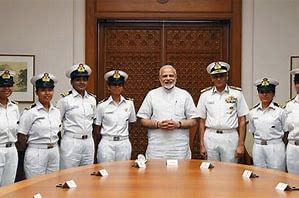
Why in News?
The Union Minister for Fisheries, Animal Husbandry and Dairying will release a book and video on “Sagar Parikrama”.
About Sagar Parikrama:
- It is an outreach program intended to reach out fishermen community across the entire coastal belt of the country through a predetermined sea route.
- The initiative has been launched to understand the issues, experiences, and aspirations of fishermen and also to create awareness of various schemes and programs of the Government available to fishermen in coastal areas.
- Nodal Ministry: Ministry of Fisheries, Animal Husbandry and Dairying.
- The Sagar Parikrama Yatra spanned over 12 captivating phases in just 44 days. The Yatra meticulously navigated the diverse coastal tapestry of India, covering an impressive coastal length of 7,986 Kilometres out of 8,118 Kilometres, touching 3,071 fishing villages in 80 coastal districts of all the Coastal States/UTs.
- During the Sagar Parikrama events, certificates and sanctions related to the Pradhan Mantri Matsya Sampada Yojana (PMMSY) and Kisan Credit Card (KCC) were awarded to progressive fishermen, fish farmers, and young fishery entrepreneurs.
- Literature on various schemes, including PMMSY, KCC and others, was disseminated through print media, electronic media, videos, and digital campaigns to raise awareness among fishers.
Key Facts about India’s Fisheries Sector:
- India has a coastline of 8,118km, covering nine maritime states and four UTs and provides livelihood support to 2.8 million coastal fishermen.
- The country contributes 8% of the global share of fish production and is ranked third-largest fish producer in the world.
- The total fish production of India is 162.48 lakh tonnes (2021-22), of which 121.21 lakh tonnes are from inland and 41.27 lakh tonnes from marine, with exports of over Rs 57,586 crore contributing to about 17% of agriculture exports.
Source: PIB
GS-III
TRAFFIC (Trade Records Analysis of Flora and Fauna in Commerce)
Subject: Environment
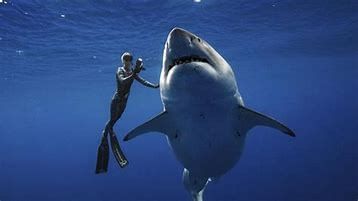
Why in News?
An analysis by TRAFFIC and WWF-India between January 2010 and December 2022 has revealed that Tamilnadu accounted for almost 65% of illegal trade in shark body parts.
Background:-
- Illegal trade in wildlife species is a serious conservation threat.
About TRAFFIC:-
- TRAFFIC (Trade Records Analysis of Flora and Fauna in Commerce), the Wildlife Trade Monitoring Network, is a global non-governmental organization monitoring the trade in wild plants and animals.
- TRAFFIC focuses on preserving biodiversity and sustainable legal wildlife trade while working against unsustainable illegal wildlife trade
- TRAFFIC’s mission is built on the long-term vision of the Kunming-Montreal Global Biodiversity Framework: a world living in harmony with nature where by 2050, biodiversity is valued, conserved, restored, and wisely used, maintaining ecosystem services, sustaining a healthy planet and delivering benefits essential for all people.
- It was originally created in 1976 as a specialist group of the Species Survival Commission of the International Union for Conservation of Nature (IUCN), and evolved into a strategic alliance of the World Wide Fund for Nature (WWF) and the IUCN
- TRAFFIC IS part of the Cambridge Conservation Initiative – based in the David Attenborough Building – a hub which brings together Cambridge University and several international NGOs striving for sustainability and to conserve nature.
- TRAFFIC came to India in 1991, operating as a division of WWF-India.
Source: The Hindu
OCEANSAT-3
Subject: Science and Technology
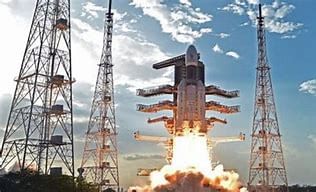
Why in News?
ISRO’s Oceansat-3 reveals phytoplankton bloom that maintains marine ecosystem.
Background:
- The satellite revealed the seasonal greening and browning of continents, alongside the dynamic movements of chlorophyll blooms in the oceans, from April to December 2023. Phytoplankton are microscopic, photosynthetic organisms that form the foundation of the marine food web. They play a crucial role in the Earth’s ecosystems as primary producers, converting sunlight into chemical energy through photosynthesis.
About OCEANSAT-3
- Oceansat-3, also known as Earth Observing Satellite 6 (EOS-6), is a remarkable oceanographical Earth observation mission launched by the Indian Space Research Organisation (ISRO).
- Oceansat-3 was launched on 26th November 2022.
- It is part of India’s ocean observation program and is the third satellite in the Oceansat series.
- The satellite is designed to operate until 2027.
Oceansat-3 is equipped with multiple sensors to observe various parameters:
- Ocean Colour Monitor (OCM-3): Measures Ocean colour data, providing insights into phytoplankton distribution and other biological processes.
- Ku-band Scatterometer (SCAT-3): Provides high-resolution global ocean surface wind speed and direction information.
- Sea Surface Temperature Monitor (SSTM): Measures Sea surface temperature (SST) variations.
Oceansat-3’s data is crucial for:
- Oceanography: Studying ocean currents, upwelling zones, and marine ecosystems.
- Climatology: Monitoring climate patterns and changes.
- Meteorology: Enhancing cyclone prediction.
- Fisheries: Identifying potential fishing zones.
Continuity and Enhancement:
- Oceansat-3, in conjunction with Oceansat-2, improves the frequency of measurements:Ocean colour measurements are now available every 24 hours, Wind vector measurements are available every 12 hours.
Source: India Today
JUNO SPACECRAFT
Subject: Science
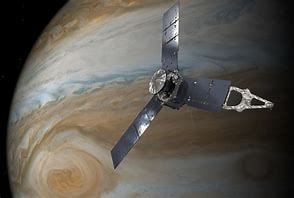
Why in News?
Recently, NASA posted an image of Great Red Spot on Jupiter captured by Juno spacecraft.
Background:
- The Great Red Spot is a giant anticyclonic storm that is larger than Earth itself. It has been observed since the 17th century and continues to be a fascinating subject of study for scientists. Juno’s mission to Jupiter has provided us with unprecedented views of this iconic feature, allowing us to delve deeper into its mysteries.
About JUNO SPACECRAFT:
- NASA’s Juno spacecraft is a space probe orbiting Jupiter.
- It was built by Lockheed Martin and is operated by NASA’s Jet Propulsion Laboratory.
- The spacecraft was launched from Cape Canaveral Air Force Station on August 5, 2011, as part of the New Frontiers program.
- Juno entered a polar orbit of Jupiter on July 5, 2016, after a five-year, 1,740-million-mile journey.
- The spacecraft’s mission is to measure Jupiter’s composition, gravitational field, magnetic field, and polar magnetosphere.
- It also aims to search for clues about how the planet formed, including whether it has a rocky core, the amount of water present within the deep atmosphere, mass distribution, and its deep winds.
- Juno is the first explorer to peer below Jupiter’s dense clouds to answer questions about the gas giant itself and the origins of our solar system.
- Now in an extended mission phase, the agency’s most distant planetary orbiter continues its investigation.
- This extension tasks Juno with becoming an explorer of the full Jovian system – Jupiter and its rings and moons – with additional rendezvous planned for two of Jupiter’s most intriguing moons: Europa and Io.
Source: Business Today
World Gold Council (WGC)
Subject: Economy
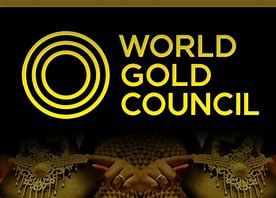
Why in News?
The Reserve Bank of India (RBI) bought 8.7 tonne of gold in January, making it the largest purchase by the central bank since July 2022, according to World Gold Council data.
About World Gold Council (WGC):
- It is the market development organisation for the gold industry. It is a nonprofit association formed in 1987 whose members comprise the world’s leading and most forward-thinking gold mining companies.
- It was established to promote the use of and demand for gold through marketing, research, and lobbying. It is also the global authority on gold, and they offer comprehensive analyses of the industry.
- Headquartered in London, with operations in India, China, Singapore, and the USA, the WGC covers the markets which comprise about three-quarters of the world's annual gold consumption.
- It is an advocate for gold consumption. The WGC aims to maximize the industry's potential growth by monitoring and defending existing gold consumption.
- It achieves this by setting up gold standards, proposing policies, ensuring fairness and sustainability in the gold mining industry and promoting the usage and demand for gold for individuals, industries, and institutions.
- It also co-sponsors research in the development of new uses for gold, or of new products containing gold.
- WGC was the creator of the first gold exchange-traded fund.
Source: Financial Express
|
38 videos|5288 docs|1117 tests
|
FAQs on UPSC Daily Current Affairs- 15th March 2024 - Current Affairs & Hindu Analysis: Daily, Weekly & Monthly
| 1. What is the purpose of the TRAFFIC program in the context of trade records analysis of flora and fauna in commerce? |  |
| 2. How does the OCEANSAT-3 satellite contribute to the study of oceans and marine life? |  |
| 3. What is the significance of the JUNO spacecraft in space exploration? |  |
| 4. Who was Gulbadan Begum and what was her role in history? |  |
| 5. How does the GS-III paper of the UPSC exam cover topics related to trade records analysis and space exploration? |  |
















